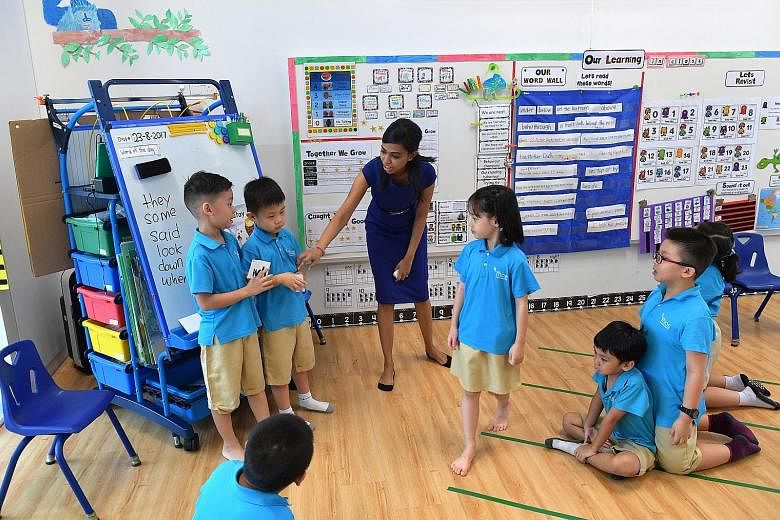Some private pre-school operators are watching the changes in the sector with concern, after the Ministry of Education (MOE) announced on Monday that children in its kindergartens would get priority admission in the Primary 1 registration exercise.
Smaller players are worried about being squeezed out as MOE expands its reach and adds an advantage to attending its kindergartens, though MOE said the move is to better ease children into Primary 1 education.
Under the new rules, children in its 12 kindergartens will be allowed to apply for places in the primary schools whose premises the kindergartens share, under Phase 2A2 of the registration scheme, which now applies to children whose parents or siblings were former pupils but are not in the alumni association.
"This will put private schools which are not affiliated with any primary school at a disadvantage," said Ms Kelly Chua, principal of Appleland Playhouse, a childcare centre with 170 children.
Appleland in Telok Blangah might feel the heat from the MOE kindergarten in Blangah Rise, whose children will get priority admission to Blangah Rise Primary. Parents of children who are eligible for admission in later phases than 2A2 might feel pressured to move them to MOE kindergartens, said Ms Chua.
MOE entered the pre-school sector in 2014, with the goal of raising the quality of early childhood education here. The kindergartens will charge $160 a month from next year, up from $150 now, and take in 60 to 120 children each. This can go up to 160 if there is demand.
-
Experts advise against co-locating kindergartens with popular schools
-
If the Ministry of Education (MOE) were to situate a kindergarten together with a popular primary school, demand for the kindergarten would shoot up because of the benefit of priority access, said education experts.
They noted that MOE has to carefully consider the impact of co-locating kindergartens with sought-after schools, now that it has stipulated priority admission for children in the kindergartens to those schools.
Jalan Besar GRC MP Denise Phua, who heads the Government Parliamentary Committee for Education, said: "Locating MOE kindergartens on the premises of currently popular primary schools, such as Rosyth, and adding the new benefit of priority access, would make the popular primary schools even more in demand.
"It would render the dream of every school (being) a good and desirable school less achievable," she said. "If popular primary schools become even more popular because of this priority, then it would be harder to level the playing field."
In response to queries, MOE said that up to 2020, all its kindergartens will be inside government primary schools. The locations of new kindergartens beyond 2020 will be announced at a later date, its spokesman said.
She added that in setting up the kindergartens, MOE and the Early Childhood Development Agency work together to identify estates with higher demand for pre-school places as suitable locations. These include new estates and mature estates with upcoming housing developments.
Government-aided primary schools, such as Ai Tong School and Nanyang Primary School, will not be included in the ministry's kindergarten plans up to 2020.
Amelia Teng
By 2023, MOE hopes to have 50 kindergartens located in primary schools and offering 14,000 places - enough to cater to a fifth of all Singaporeans and permanent residents aged five and six. There are about 450 kindergartens here now, with a median monthly fee of about $170.
Dr T. Chandroo, chief executive of pre-school chain Modern Montessori International, which has two centres in Sengkang, said the new policy would affect all private operators in the long run as more MOE kindergartens come up.
"Instead of being able to play a pivotal role in the child's life in his formative years from birth till six years of age, there is a likelihood that parents may leave our centre after the nursery programme for the MOE kindergarten," he said, adding that private operators may become centres for just children aged up to four.
Dr Timothy Chan, director of SIM Global Education's academic division, noted that early childhood education was a key part of the National Day Rally speech given by Prime Minister Lee Hsien Loong, who announced plans to invest in pre-schools and ramp up places for young children.
"The role of the state stepping in is to level the playing field from the beginning and provide an education experience that can be enjoyed by many people without them having to pay hefty fees that some private pre-schools charge," he said, adding that private pre-schools must find "new value propositions" to keep parents going to them.
Ms Iris Lim, principal of Chiltern House, would agree. Its five centres in areas such as Thomson and Mountbatten are known for an emphasis on speech and drama, and boast small class ratios of 14 children to two teachers.
Dr Chandroo said his group's centres differentiate themselves from other schools by offering its core Montessori curriculum, emphasising a learning approach tailored to individual children's needs. He said: "We are always open to re-inventing ourselves to be relevant in this changing business landscape."


